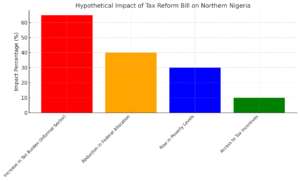
By Fatima Saka
Since the introduction of the Tax Reform Bill and its subsequent second reading in the Senate, the proposal has sparked heated debates, particularly among northern senators. Many have expressed strong opposition, labeling the bill controversial and potentially detrimental to the interests of their region.
Consequences of the Tax Reform Bill on Northern Nigeria
The impact of the Tax Reform Bill on northern Nigeria—or any region—depends on its specific provisions and how these align with the socioeconomic characteristics of the region.
Potential Disadvantages
1. Economic Structure
Northern Nigeria’s economy is predominantly agrarian, with limited industrial and commercial activities compared to the southern regions. If the reform targets informal or agricultural sectors, it could disproportionately burden the North, where such sectors dominate.
2. Revenue Allocation
Northern states rely heavily on federal allocations for their budgets. If the reform reduces allocations from federal revenue, it could create significant fiscal challenges for these states.
3. Poverty Levels
With poverty rates already higher in the North than in the South, an increase in taxes on goods and services could deepen economic hardships for the region’s residents.
4. Infrastructure and Social Investment
Northern states may lack the infrastructure and industrial base to benefit from potential tax incentives aimed at stimulating urban and industrial growth, leaving the region at a disadvantage.
Potential Advantages
1. Redistribution Policies
If the bill incorporates measures to redistribute resources or introduce targeted subsidies, it could help address developmental imbalances between the North and South.
2. Boosting Federal Revenue
Increased federal revenue could be directed toward underdeveloped regions, including northern Nigeria, especially if there is a deliberate focus on equitable allocation.
3. Support for Agriculture
If the reform includes incentives for agriculture or rural development, northern Nigeria could benefit significantly, given its strong focus on farming and livestock production.
Key Considerations
To determine whether the Tax Reform Bill places the North at a disadvantage, it is essential to evaluate:
The specific taxes being reformed (e.g., VAT, income tax, corporate tax).
The fairness of revenue sharing among states.
Whether the reform addresses regional disparities in economic development.
Statistical Perspective
Analyzing the potential disadvantages of the Tax Reform Bill requires concrete data. Key areas to examine include:
1. Increase in Tax Burden: The proportion of informal sector workers likely to be affected.
2. Reduction in Federal Allocation: The projected decrease in federal funds for northern states.
3. Impact on Poverty Levels: Potential rise in poverty rates due to increased taxation.
4. Access to Tax Incentives: The percentage of industries in the North likely to benefit from tax incentives.
Visualization of Hypothetical Impacts
Below is a hypothetical chart illustrating the estimated disadvantages of the Tax Reform Bill on northern Nigeria, highlighting concerns about tax burdens, reduced federal allocations, rising poverty, and limited access to incentives.

Conclusion
The debate surrounding the Tax Reform Bill reflects deeper concerns about equitable development and the economic realities of northern Nigeria.
A balanced approach to reform that considers the region’s unique challenges and opportunities is critical for fostering inclusive growth across the country.

